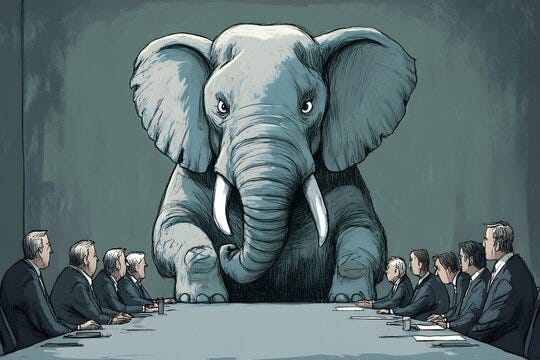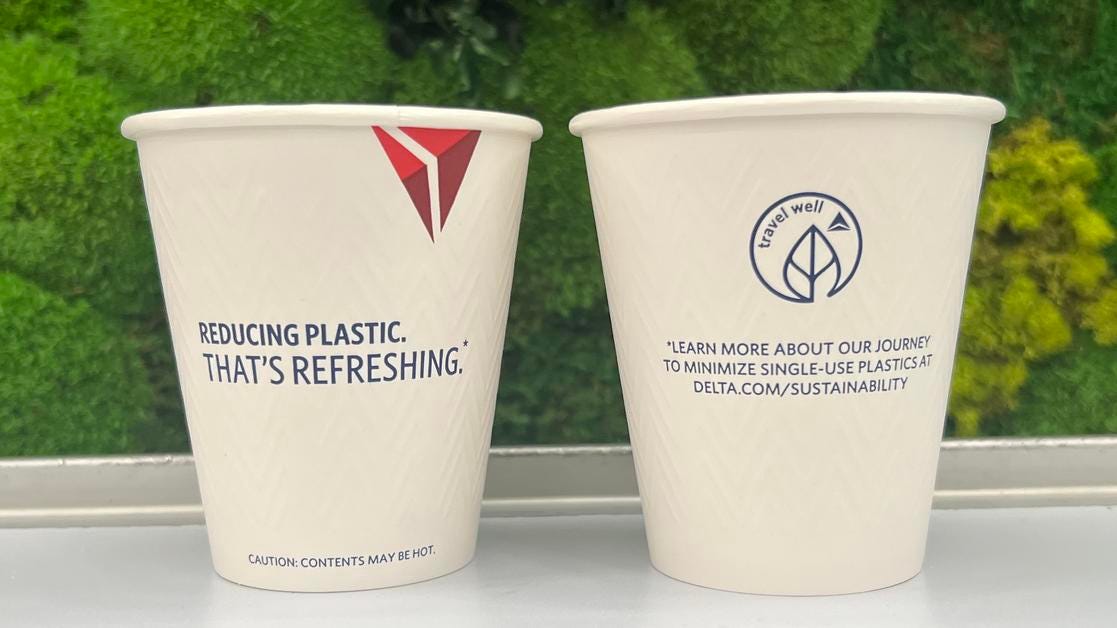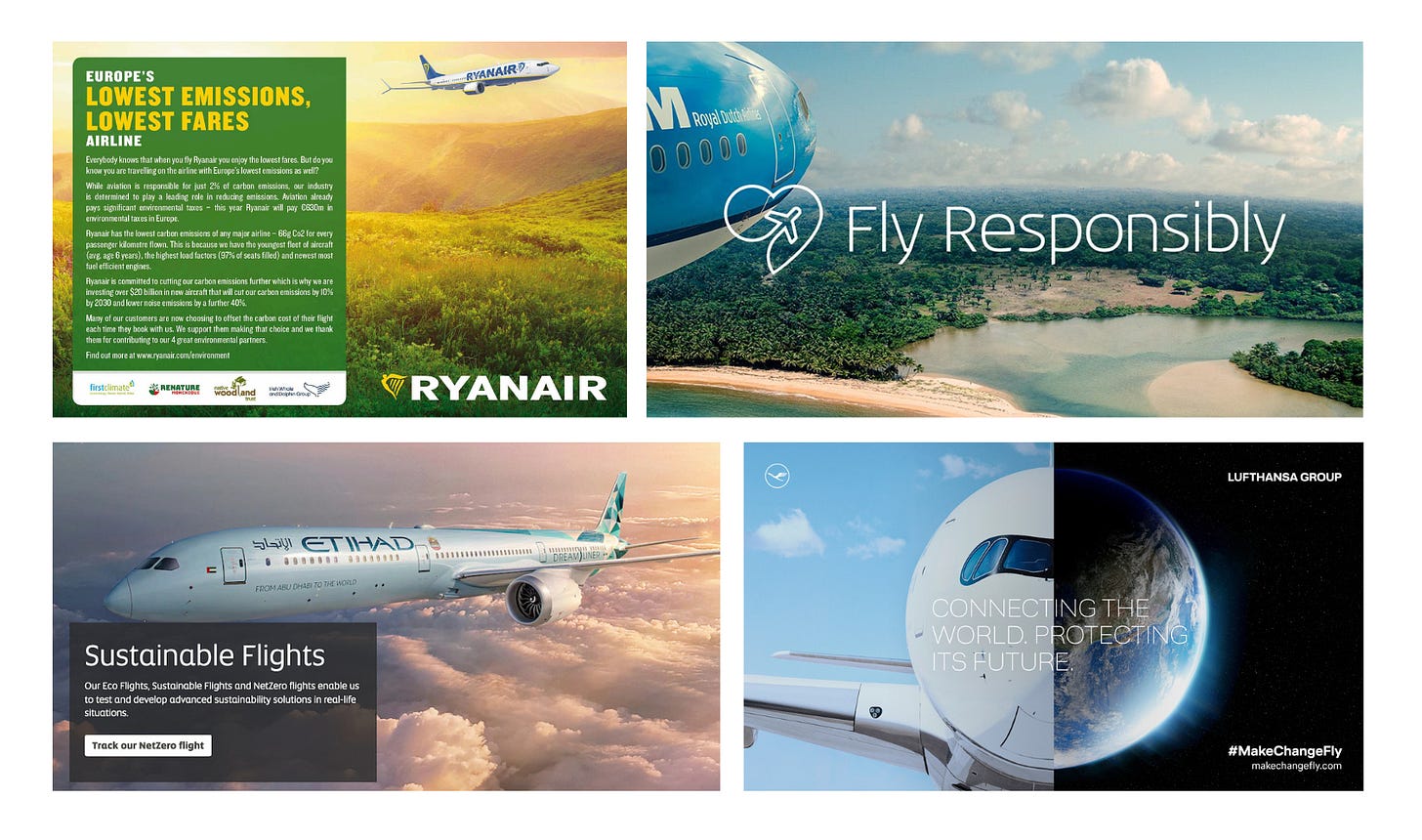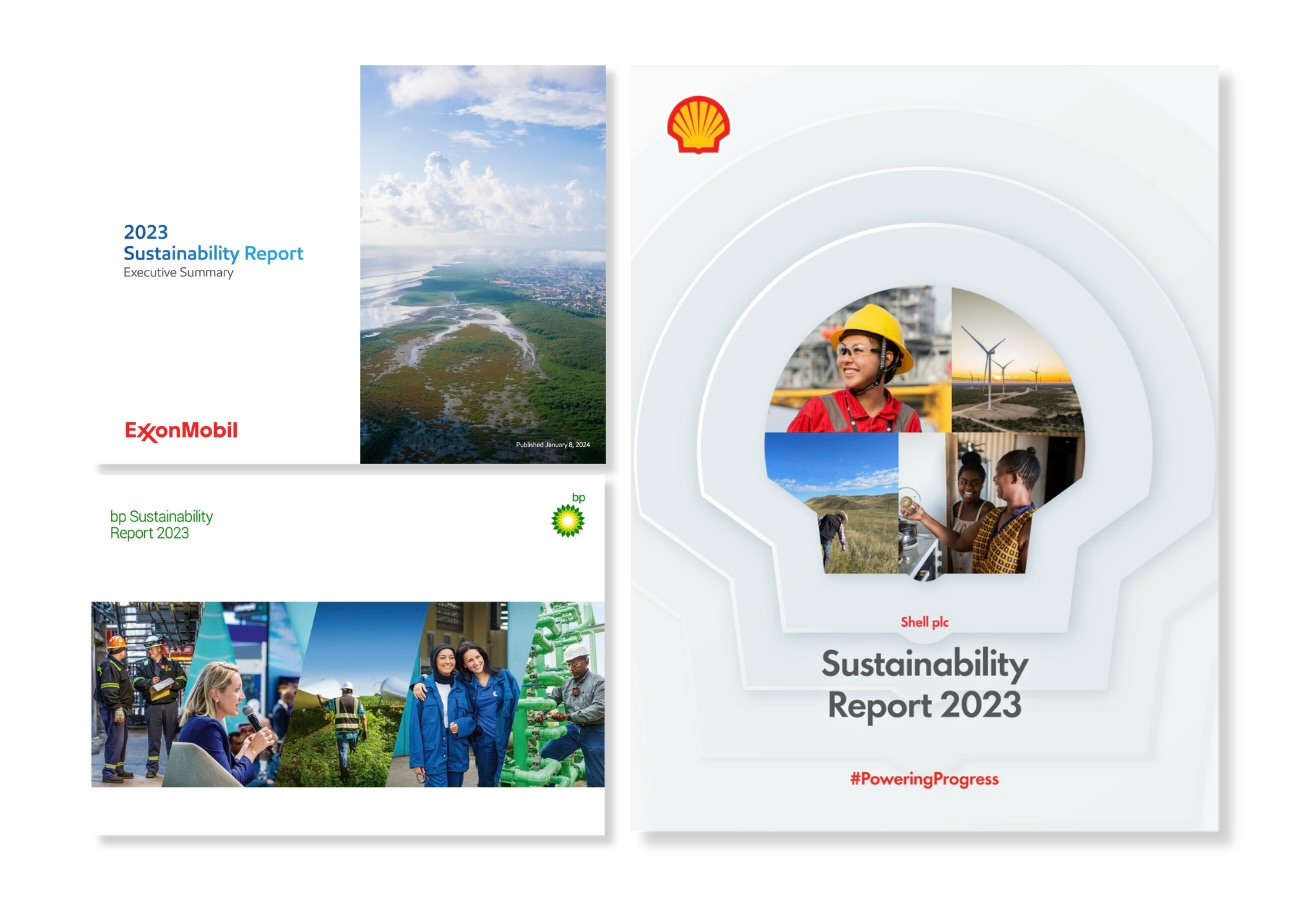TCC #43: Corporate sustainability still won't address the elephant in the room
What will it take for companies to stop hiding behind pseudo climate action?
You know what I hate most about corporate sustainability talk?
It's not the weasel words (although they do grind my gears).
It's not the absolutely underwhelming commitments (if I see another 11% Scope 1+2 reduction commitment, I’ll tear my hair out).
It’s not even — as much as it kills me — the quiet dropping of previously publicized sustainability goals (here’s looking at you, Coca-Cola).
It's the fact that they will almost never address the elephant in the room.
Now, to be fair, elephants are not equally distributed. If you're Stripe, for example — well. It's pretty easy to be straightforward about your (relatively minimal) environmental or social impact and what you’re doing to address it, because actually addressing it is easy and doesn’t affect your core business model.
Stripe is unlikely to have to face down a big elephant in the room — that is, a big hairy environmental or ethical problem that no one wants to talk about. But if we look hard enough at most companies, we can find an elephant or two. And in 2024, almost no company will truly acknowledge their elephants.
Instead, companies will do — and talk about — almost anything else.
Take this article I saw a while back on Delta's introduction of recyclable cups on flights.
I want to be clear here, I'm not criticizing the article (which is clear upfront about the impact of this initiative) or anyone on Delta's sustainability team. I know sustainability professionals. I work with them. They're the best people you've ever met, and they work so hard in this complicated, frustrating, sometimes-virtually-impossible field. The person who takes a sustainability role at an airline is not looking for a cushy job.
But seriously — cups?
It’s 2024, and with COVID-19 lockdowns well and truly lifted, global greenhouse gas emissions are skyrocketing. Aviation currently accounts for 4% of global warming, a figure that will only rise given how difficult it is to decarbonize this industry. Meanwhile, airlines are going about business as usual, making outrageous greenwashing claims, misleading millions of consumers, and the best they've got is....
cups?
That's what I mean about the elephant in the room. I’ve seen it referred to as brownwashing, and it’s a real problem. How can we take Delta seriously here? How can we trust that they're on the right track?
(Well, for airlines, we can't really, but that's another story.) In fact, here’s a few of my favourite air-travel-related greenwashing examples. (If you’ve found any in the wild, I’d love to see them!)

Alright, so aviation is screwed.
Let's choose a different industry.
Let’s skip over to food and beverage.
You’ve got some big sustainability players here: Coca-Cola, Nestlé, PepsiCo and more are making big claims and seemingly pouring a lot of money into climate and environmental initiatives.
How many of them are devoting enough page space to obesity? Diabetes? Chronic illness caused by the overconsumption of unhealthy foods? The fact that these companies spend billions on advertising every year in order to sell more frankenfoods in a country like the US, where there are already almost 4000 calories available daily for every human being. (Side note, check out this incredible nutritionist on ‘food politics’.)
When was the last time food companies talked about this?
Okay, so the food industry is a mess. Let’s pivot again.
Let’s take tech: the supposed good guys in all of this.
Let’s take a company that has done an impressive job advertising its sustainability initiatives.
Let’s take Apple.
For a company lauded for its creativity and innovation, and one that has inspired copycats the world over, Apple has the potential to take a genuine leadership position in tech — hardware in particular.
But unfortunately, a good chunk of Apple’s innovation in recent years has gone not to making beautiful, environmentally thoughtful products, but instead to trying to squeeze as much out of consumers as possible.
Take its constant ‘upgrading’ of charger types or its claims that excluding chargers and earbuds from its iPhone sales is an ‘environmental’ decision; its planned obsolescence and refusal to support software upgrades on perfectly functioning hardware; screamingly obvious moves like removing the iPhone headphone jack to force customers into buying AirPods, glueing devices to disable repairs and lobbying against consumer-friendly right to repair legislation.
Apple claims to want to change lives and delight customers — but only for two years, before their scheduled breakdowns begin and customers come walking back through its shiny glass doors.
All this and we haven’t even talked about the social media companies and their influence on teen mental health and political instability. Or how AI’s carbon footprint has suddenly derailed the climate progress of tech companies that had actually seemed like they might hit their targets (oh hey, Microsoft).
Let’s explore one more big tech example before we throw in the towel.
Let's take a company that is pouring a lot of money into corporate sustainability initiatives.
Let's take Amazon.
In corporate climate circles, Amazon is considered somewhat of a figurehead.
I recently read Chrissa Pagitsas’ Chief Sustainability Officers at Work, which profiles an Amazon sustainability leader and waxes lyrical about the company’s sustainability efforts. They talk about the company’s new electric vehicle fleet, its renewable energy PPAs (Amazon is actually the largest corporate buyer of renewable energy), and its nature restoration fund.
You know what doesn't get a mention?
The fact that Amazon spends millions every year finding ways to make people buy things they never would have needed, wanted, or even known about otherwise. In all this talk about fleet electrification and recyclable packaging, who’s talking about the products themselves?
In the entire interview within the book, the actual products barely get a mention. They discuss an initiative that makes it “easy to discover and shop for more sustainable products.” So basically, not doubling down on responsible procurement but instead making it easier for consumers to buy more without feeling guilty about it.
Hmm, consumer choice. Reminds me of a certain BP campaign about a personal carbon footprint. Smells like greenshifting.
Here’s the reality: for Amazon (its ecommerce wing, at least), growth means selling more physical products that use and abuse the earth’s natural resources and then end up in landfill where they do even more damage. But how many more products do people really need?
You’ll notice Amazon won’t talk about this.
I don’t blame Pagitsas or the Amazon sustainability manager profiled in the book for not bringing this up. It’s not like it ever would have made it past the legal team anyway.
Of course, just like with Tesla or Facebook or virtually any unicorn company, the real elephant in the room for Amazon now is Bezos. Not his yachts or his private jets — that’s an obfuscation of the real problem, which is his political influence. It’s unnerving when your newspaper, at the last minute, refuses to endorse a presidential candidate. Especially when your execs meet with Trump hours later, or when you’re feeling so “optimistic” about Trump’s second term that you book a dinner together. Trump and Bezos are the tip of the rapidly melting iceberg. The right-wing radicalization of radically wealthy Americans appears to be a trend. Any party that opposes the billionaire class is going to have a tough time.
But perhaps the biggest elephant in the room is corporate lobbying.
In case you’re unfamiliar with the concept, this is where companies spend millions sending their henchmen to capital cities to wine, dine, and bribe elected officials to vote on legislation in the companies’ favour.
In corporate climate circles, this is about the worst-kept secret on the hill. Big oil spends hundreds of millions in pro-fossil-fuel lobbying, all while releasing shiny happy reports about how they’re miraculously on track to meet their net zero goals while simultaneously achieving some of their biggest revenue-generating years ever.
Unfortunately, it's not just the big bad wolves who are doing this. Even the supposed ‘good guys’ have given hundreds of thousands of dollars to climate deniers.
It's absurd, and it boggles the mind, but it's not funny.
It's actually, as I discovered when I Googled 'elephant in the room image', pretty fucking scary.
The elephant in the room is not going to go away. It's only going to get more angry and more obvious and more dangerous.
And as ordinary people get more stressed, more distracted, and more hopeless, they’ll be even more likely to turn a blind eye to the forces that are making life less and less livable — economically, culturally, and environmentally.
We’ve had comments on this blog about the incompatibility of sustainability and capitalism. People have called corporate sustainability the ultimate oxymoron. I appreciate the sentiment. I don’t know if there is a perfect future in which corporations can keep producing and selling without pushing the planet to its limits. But I do know that there’s a huge middle ground — one that might not be perfect, but is certainly better than what we’re seeing today.
Can sustainability professionals get their employers to acknowledge the elephant in the room? At the larger companies, probably not. Definitely not. Rock the boat too much and Bezos will throw you overboard.
So the best thing we can do is say out loud what many of them cannot say without losing their jobs. We can call it out, putting the pressure on them from the outside, giving sustainability professionals the leverage they need to push actual change higher on the corporate agenda.
It’s a shame on so many levels, though. For Meg and I, in our work helping companies communicate their sustainability initiatives, it’s incredibly frustrating, not least because to talk about cups when your industry burns more carbon than most countries is to almost ensure that nobody takes your sustainability work seriously.









the way i audibly SCOFFED at the idea of amazon as a 'sustainability leader'
Great post! If you haven't watched "Buy Now- The Shopping Conspiracy" on Netflix, I highly recommend it. Apple and Amazon are two of the offenders they highlight specifically.